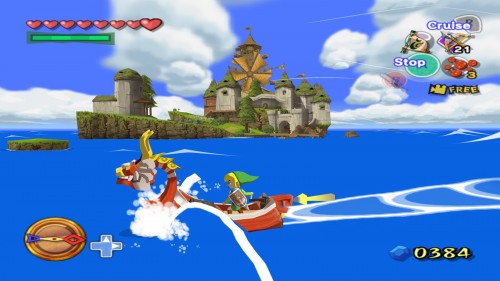Bomber’s Notebook #007 – Succumbing to Zelda Addiction
Posted on July 17 2012 by Majora's Cat
 Why can Zelda be so addicting sometimes? Zelda addiction happens to many individuals that lay their pretty fingers on a Zelda title. The “holy lobsters this game is so awesome now I can’t put it down” syndrome that quite a few Zelda fans have experienced with the franchise is common but still a strange beast. How can a game franchise that usually doesn’t have online multiplayer, has few in-game rewards after conquering the main storylines for the first time and no extra modes to toy around with continually release installments that spellbind its players? There are always explanations for humankind’s most asked questions, and there certainly is one in this instance.
Why can Zelda be so addicting sometimes? Zelda addiction happens to many individuals that lay their pretty fingers on a Zelda title. The “holy lobsters this game is so awesome now I can’t put it down” syndrome that quite a few Zelda fans have experienced with the franchise is common but still a strange beast. How can a game franchise that usually doesn’t have online multiplayer, has few in-game rewards after conquering the main storylines for the first time and no extra modes to toy around with continually release installments that spellbind its players? There are always explanations for humankind’s most asked questions, and there certainly is one in this instance.
The Legend of Zelda franchise has always consisted of enthralling, brilliantly designed games, but there’s something magical about them that inspires gamers to perform speed runs and play Zelda games over and over both for sport and in a leisurely fashion. Make the jump to read more.
First off, Zelda games have always featured a familiar overworld-to-dungeon and back again format. Though this format doesn’t sound the least bit interesting or original, the variation between dungeon and overworld provides good balance between hardcore gameplay and periods of respite. Many gamers critique this aspect of Zelda games, as until recently with Skyward Sword, Nintendo has refused to tamper with the overworld-to-dungeon formula. However, I think that the time in between dungeons, where players have the luxury to search for hidden treasures and unearth secrets, is one of Zelda’s biggest hooks.
Let’s forget about speed runners for a second. Bountiful amounts of sidequests and items wait in store for the player to discover, if he/she wishes to spend a little time outside of the main quest. I know that in titles such as Majora’s Mask and The Wind Waker where the world was Link’s oyster, my mind was fixated completely on unlocking all possible unlockables and exploring every corner of the game world. That alone can suck several, maybe dozens of hours away from gamers.
Zelda doesn’t reward players with Gamerscore points or achievements. Instead, at the end of The Legend of Zelda, The Adventure of Link, Skyward Sword and The Wind Waker, you are faced with the option of restarting the quest on a slightly altered mode. In Skyward Sword‘s Hero Mode, Link’s skills in battle are truly tested, as enemies do twice as much damage. It seems like a continuation of the previous save file, as Link may keep some treasures that were previously obtained.
 The original The Legend of Zelda‘s Second Quest is also more difficult than the first. Exploration is quite difficult due to the abundance of powerful enemies in the overworld and the lack of an in-game map. The Second Quest throws a curveball at the player – dungeons are located in different spots and the difficulty level is upped significantly. These “additional adventures” at the end of certain Zelda games offer an incentive for Link to continue his questing on the already-completed save file.
The original The Legend of Zelda‘s Second Quest is also more difficult than the first. Exploration is quite difficult due to the abundance of powerful enemies in the overworld and the lack of an in-game map. The Second Quest throws a curveball at the player – dungeons are located in different spots and the difficulty level is upped significantly. These “additional adventures” at the end of certain Zelda games offer an incentive for Link to continue his questing on the already-completed save file.
Re-releases and remakes also keep gamers interested in Zelda. With the unveiling and release of a new console brings rumors of possible remakes. Even now, the possibility of a Majora’s Mask remake and A Link to the Past remake on the Wii U is a hot topic. Nintendo hasn’t been shy with re-releasing classics, especially with Zelda. Ocarina of Time has been released for the N64, GameCube, Wii, and remade for the Nintendo 3DS. Gamers that have been playing for years will feel the urge to buy another copy of their favorite games, and consequently will have them replaying Zelda games that they probably finished years ago.
Speed runners play games repeatedly, using shortcuts and glitches to complete games in ridiculously short times. Zelda has no shortage of dedicated speed runners, and their existence may inspire others to perform the same feats they have. Since The Legend of Zelda offer little in the way of achievements or features outside of the main quest, hardcore fans can only get their kicks from doing speed runs, three heart challenges and the like.
With the passage of time, fans find new reasons to fall in love with Zelda again and waste precious time playing these video game masterpieces. Nintendo is releasing new installments in the franchise at a quicker rate than before, drawing in a larger fanbase and keeping gamers interested in a series that has withstood almost three decades of competition.
Have you ever become addicted to Zelda? Feel free to let us know in the comments below.
~~~Recent Content Updates~~~






